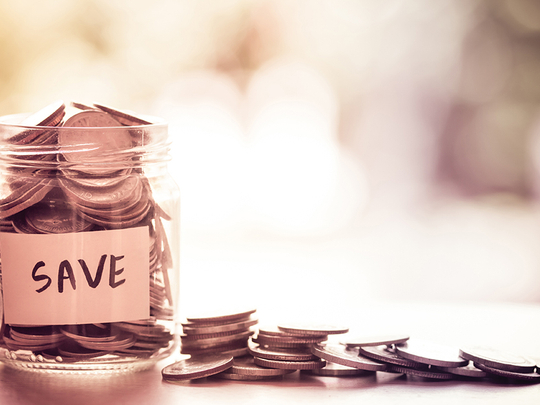
Dubai: We all know how to spend but not all of us know how to or actually save.
Here’s a few tips culled from financial guru Dave Ramsey, who has helped millions of families in the US to become debt-free, and personal finance expert Alexa von Tobel on how to win with money.
1) Have a written game plan: use the zero-based budget!
If you’re one of the many residents who scratch their heads after each month trying to recall where their whole month’s salary went, it’s time to stop and make a written budget.
This may seem common sense but our survey of a 100 people says 52 per cent don’t do budgets or they just budget mentally.
A budget is telling your money where to go instead of wondering where they went, according to Dave Ramsey. So, before each month starts, sit down (with your spouse if you’re married) and write down your financial action plan for the month and stick to it. Give every dirham a mission and the total of budget must be equal to zero every time.
Also, pay off all your debts as soon as you can and stay out of debt. That way, you have money to set aside for your needs and savings. Install spending tracker apps on your phone so you can monitor your expenses or write them down. Do this for three consecutive months and it’ll become a habit.
2) Make savings and giving part of the budget.
In terms of giving, whether it’s to a charity or to anyone in need, allocate. You’ll never know how a Dh10 or Dh100 can make a difference in another person’s life.
3) The Dh5 rule.
If you don’t know where to start when it comes to saving, try this rule. Every time you see a Dh5 bill in your wallet, don’t spend it! Tuck it away in a coin bank as your savings. Open it after a year and you’ll see just how much you saved.
4) Have a fixed allowance at work and try the No-Spend Challenge.
Even if you earned it, it doesn’t necessarily mean you can spend your whole salary on a whim. Make your “work allowance” part of the budget. That includes your petrol and other items you need to spend on while at work. Whatever is left after each week can be saved.
Also, you can take part in a No-Spend Challenge with colleagues or your spouse. The challenge is easy: just don’t spend unnecessarily and see how much you save at the end of each week.
5) Use Sinking Funds to pay for big purchases/payments.
For example, you know your car registration is due in July and it would cost you Dh3,000. Start setting aside Dh500 each month beginning January so you’ll have Dh3,000 by July. Just break down the target amount according to the number of months you’re planning to save up for it. And don’t touch it! You can have a sinking fund for almost everything. And come the time you need the money, it won’t feel like an “emergency”.
Sample Sinking Funds: school fees, healthcare, Ramadan or Eid holidays, Christmas or New Year celebrations, birthdays, gifts, furniture or appliances, air tickets, tyres or car parts, new car, investments, Dubai Shopping Festival or Gitex
6) Buy in bulk ONLY what you will actually use.
Set aside a separate amount for your groceries, usually the perishable items that you have to buy regularly and buy them as needed.
Don’t but bulk offers if you haven’t tried the item yet. If they’re not to your liking, you’ll end up not using them or throwing them away.
Allot a specific fund for your consumables that have longer shelf-life like laundry soap, cooking oil, bath soap, toiletries, etcetera that can be bought in bulk. For example, if you’re buying all these stocks that would last you three months for Dh800, set aside Dh200 each month so by the time you run out and you need to restock, you have the funds for it.
7) Always pay in cash and use the Cash Envelope System.
Have you heard of cash envelopes? Your grandma probably had them — mine did! Divide your cash according to your budget and place them in envelopes duly itemised. So if your budget for food is Dh500 a month, put it in an envelope and spend only what’s in there for that month. No cheating! The same goes for other expenses.
Here’s another reason to use cash and ditch your credit card. Calculate all the interest you’ve paid throughout the months or years you’ve used it and compare them with your savings. One Dubai resident did that and realised she paid more than Dh1,400 for interest incurred on her card for only one year.
8) Bring a calculator when grocery shopping.
Now this is an oldie but a goodie. It’s not a crime to bring a calculator (or use your phone calculator) when grocery shopping, so relax. Always know the running total of the goods you’re buying before you check out so you don’t go over your budget. And please, make it a habit to look at the price tag before chucking stuff into your cart.
For buying expensive items, calculate the number of days you have to work to pay for them. For example, you want to buy the latest smartphone in the market for Dh3,000. Your monthly takehome pay is Dh5,000. Divide that by 22 days and you get a daily wage of Dh227.27. This means, you will need to work for 13 days in order to pay for that phone. Now, is it worth it?
9) If you don’t need it, don’t buy it even if it’s on sale.
We all have these purchases that seemed enticing in the beginning because they’re on sale and are now just part of the junk we store at home. Remember, if you bought a pair of shoes you don’t need that’s Dh800 because it was 20 per cent off, you did not save Dh200, you spent Dh800 unnecessarily!
10) Get a term life insurance, contents insurance and have a will.
Having a medical emergency in the family can dry up all your savings. A breadwinner’s death can put his family’s life in jeopardy. Invest in a term life insurance to secure your dependents in the event of your death. Get a good contents insurance so your house is covered in case of a fire, burst pipe, natural calamity and others. Most of all, have a will written up so you know your assets are going where you want in the future.
ALSO READ:
■ 10 practical tips to jumpstart your savings in UAE
■ UAE Residents share views on saving
■ How to make your savings count in UAE








